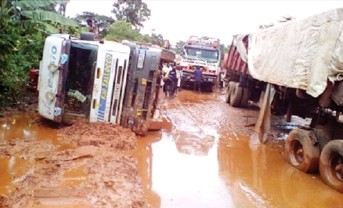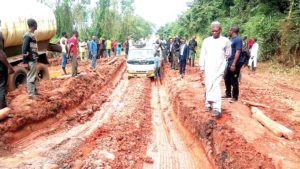
“The casualties are not only those who are dead,
They are well out of it.
The causalities are not those who are dead
Though they await burial by instalment…
The casualties are many, and a good
Number as well
Outside the scenes of ravage and wreck…” –The Casualties, by John Pepper Clark-Bekederemo
August 22, 2006. The vociferous leader of Bakassi Movement for Self-Determination, the ragtag body that vehemently opposed the Obasanjo-engineered Green Tree Agreement that ultimately would cede the contestable oil-rich parts of the Bakassi peninsula to the Republic of Cameroon, Chief Tony Ene Asuquo (1966-2006), and 21 others, lost their lives in a ghastly accident along the infamous Calabar-Itu Road.
The Chief was reported to have died while travelling the road to petition the Cross River State Government for the conspiratorial release of one Richard Ekpenyong who was being detained by the State Security Service on the orders of then Governor Donald Duke. Tears and blood soaked the spot. Condolences later poured in in drums. It was one death too many. Approximately 11 years ago.
July, 2013. A gravel-laden trailer from a quarry in Akamkpa skidded off a bad spot on the Calabar-Itu Road near Okoyong UsangAbasi Junction and smashed a fully loaded 18-seater Toyota Hiace bus that was stuck in mud. Nobody survived in both vehicles. Whereas it was nothing new, it was something devastating on this dead-trap of a road.
Late October, 2019. A 36-seater bus conveying worshippers to their annual convention lost both of its front tyres on a slippery slope, some said the driver was trying to dodge a trailer on the loose, and all in the vehicle, except the fortunate driver who may never leave the hospital, met their common end as the bus plunged into a sprawling bottomless valley on the snaky roadside.
Curiously, the resonating sorrowful tunes have not changed over these years of successive administrations in the country. There instead appears to be an inherited and transferable extant script that successors have had to follow in managing the destiny of this road linking two crude oil-endowed states in the so-called minorities’ exclave of the deltaic South/South.
For instance, to the best of retrievable memories, in spite of his many occasional grandstand mention of government’s intentions for the road, the 8 years of Chief Olusegun Obasanjo deliberately played dumb to the cries. Former President Goodluck Jonathan, like his immediate predecessor, late Umaru Yar’adua, came, saw, but looked the other way, although he creatively weaved gigantic promises around it with strings of electioneering campaigns.
The epiphanic adventure of President Muhammadu Buhari arrived with rays of hope issuing from his campaign utterances in 2015 and 2019, but till this very moment, as experiences and pictures could testify, the story has not changed for any good. Yet, as the road rapidly wears out, so would more rain of empty but bombastic promises began to fall from Aso Rock, to be later swept off with practiced excuses.

On 1st October, 2016, President Buhari had stated in his national broadcast that the Calabar-Itu Road led 11 other federal road projects where construction work has commenced. “Notwithstanding the budgetary constraints, the current budget allocated two hundred and forty billion naira for highway projects against twelve billion in 2015…The Ministry of Power, Works and Housing has received one hundred and ninety seven billion naira. Work on the following highways has now resumed: 1. Dualization of Calabar-Itu Road in Cross River/Akwa Ibom States…”
On Wednesday, May 3, 2017, the then Minister for Power, Works and Housing, Babatunde Fashola, had announced that part of the welcoming outcome of the Federal Executive Council (FEC) meeting was the approval of N54 billion for the reconstruction of the road:
“The Ministry of Power, Works and Housing had just one memorandum”, he told journalists in Abuja, “It was for the award of contract for the reconstruction of the Odukpani-Itu-Ikot Ekpene route linking Akwa Ibom and Cross River States. The road project was approved for award to Messrs Julius Berger Plc…What is expected of the Federal Government is a complete reconstruction of Calabar-Itu Road to a 4-lane expressway similar to the East West Road and not merely patching and resurfacing of the existing 2-lane road constructed in the 1970’s. And by this time next year, the stories on the road will change.”
On Tuesday, November 28, 2017, Babatunde Fashola, again, in a keynote address delivered at the United Nations co-sponsored capacity building programme for the Federal Road Safety Corps, in Abuja, acknowledged that there were some roads in the country that were built in the 1970s which had not only outlived their design life, but have had to deal with increased tonnage and capacity beyond what their design intended. “Can such roads be truly expected to still be intact and deliver a pleasant motoring experience? . . . Thankfully, these type of roads are NOW receiving attention under President Buhari, as the Calabar-Itu-Odukpani Road, Gombe Biu, Illorin-Jebba and other roads that fall within this category are being awarded for reconstruction”, he stated.
In July, 2018, two months above the time “the stories on the road will change” – the then Senior Special Adviser to President Muhammadu Buhari on National Assembly Matters (Senate), now Special Adviser to the President on Niger Delta Affairs, Sen. Ita Solomon Enang, speaking characteristically on Inspiration Radio, Uyo, following what he called “pre-construction inspection and flag-off of the main construction work”, told his Akwa Ibom people: “The Federal Government is not reconstructing the entire Calabar-Itu Road, even though the road will be dualised. Where it needs patching, it will be patched. The President has mandated me to go around the road and show Julius Berger where there are rough portions for them to intervene”.
Closest to the 2019 Presidential election, Sen, Enang said the federal government had released 11billion in addition to 5billion already paid to Julius Berger, the reason for which he was on the road to see things for himself: “We are here at Calabar–Itu-Ikot Ekpene Federal Highway where the Federal Government awarded contracts to Julius Berger Nigeria Construction for the dualization of the road. So, I came here on behalf of the Federal Government to look at the extent of work that is going on. I am impressed by the extent of work done….We all came to see the extent they have gone because we have money in the budget this year for this road.”
In October, 2019, the former Senator and three-term House of Representatives Member told the world on radio that Julius Berger left the site because the National Assembly slashed the money meant for them: “We have taken steps to ensure Julius Berger returns to site. In 2019 budget, we secured N3.9 billion but much has not been released to the contractor. We are appealing to them that even though we have not given them what is substantial enough, they will return to site when the rain stops”.
While it is not possible to tell or quantify the exact loss in human and material resources on the Calabar-Itu Road, it bothers reason that since it began getting bad by the day, no committed and genuine attempt had been made by government to provide a lasting solution. The only time in recent memory that something close to temporary relief was provided was in August, 2016 when the Niger Delta Development Commission (NDDC), under the protem management of Mrs. Ibim Semenitari, played the interventionist role when it engaged four indigenous contractors to patch-up the road.
The commonplace pattern nowadays is that if you travel from Akwa Ibom, say Uyo, to Cross River, Calabar town in most cases, or the reverse, and get to your destination that same day and with all your body parts and luggage still intact, a welcome party or testimonial service is held in church in gratitude to God for His special mercies upon you. Ordinarily, a journey between the distances (about 120kms) should take, at most, one and half hours. But now the least is between 9 to 12 hours on a good day; otherwise you sleep over.
The situation is so bad and glaring that not even the most competent political propagandists can cover it up with cosmetics and salted rhetoric any more. It implies that if no urgent steps were taken above the recent bedlam by State and National Assemblies, Cross River State may be completely severed from Akwa Ibom State in the next few days. And, if according to the Works Minister cumulative sum of 2.8trillion was spent on federal roads as at 2018, one wonders what percentage of impact that had on the Calabar-Itu Road?
Ever since it was constructed in 1976 by Fougerole on engagement by the altruistic and pragmatic visionary, Brig. Gen. Udoakaha Jacob Esuene (1936 -1993), in his days as military governor of South Eastern State, the recycling catalogue of failed promises by successive administrations to reconstruct or in any way improve the condition of this road is as tall as the Obudu maintains. Yet, every minute, drums of blood are wasted on this neglected oil-gushing corridor in the heart of the Niger Delta.
All said, it would be disrespectful, unpatriotic, and overly critical to impeach President Buhari’s genuine intentions for the infrastructural development of the country; or close an eye to all that the federal government may have accomplished since 2015 through both the “Change” and “Next Level” Agenda . But, like it is normally said, a critical problem demands a critical solution. Calabar-Itu Road, by any conceivable standard, is a critical problem!




